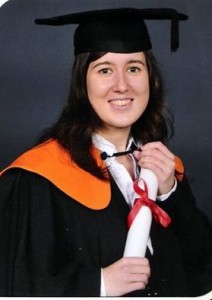Science Comma talks to Science Communcation alumna, Jessica Miller.

Jessica graduated from the University of Kent in 2013 with an MSc (Distinction) in Science Communication.
1) Why did you choose this course?
I have always enjoyed science; however, I realised during my BSc in Biological Sciences at the University of Exeter that laboratory work wasn’t for me. During the third year of my undergraduate degree I took a module in Science Communication. During this module we took an assignment where we wrote a New Scientist style article and also studied how science can influence policy making. I’ve always enjoyed writing and the Master’s course provided me with an opportunity to bring together my background in science, with my interest in writing and communication.
2) What was good about the course?
Our course was very small which provided an opportunity for shared discussion and debate around the topics we were studying; this enabled us to delve deeper into the topics and to understand them more fully. Dan and Charlotte are always available if you need support or guidance and will make the time to see you. Additionally, in many of the assignments, we were given the freedom to explore the communication of our personal scientific interests. During my undergraduate studies I specialised in biomedical sciences and the Master’s course allowed me to pursue these topics further.
3) What did you enjoy about it?
My two favourite modules in the course were called ‘Science @ Work’, which explored the presentation of science in the media and ‘Visualising Science’, which provided us with the opportunity to study the visual communication of science and the meaning and interpretation we apply to images of science. During these modules I wrote two of my favourite assignments during the course. The former explored the presentation of the MRSA scares in the UK media at the beginning of the last decade and the latter focussed on the use of imagery in anti-smoking advertisements. Both of these essays combined my interest in health and disease, with the skills I had developed in science communication.
4) What do you do and how does it use the skills you learnt on the degree?
In October 2013 I began a one year internship with a Brussels-based NGO called the European Food Information Council (EUFIC). I work in the EU Projects Communications department, where I assist in producing communications materials for EU-funded projects relating to food and nutrition. The job is incredibly varied − one day I could be writing a science brief and editing a podcast, the next, I may be helping to organise a conference and drafting copy for a project’s social media site. I also have had opportunities to travel abroad for my job and in January I gave a short presentation at a kick-off meeting for one of our projects in Crete.
The Master’s course broadened my perspective on the relationship between science and society and helped me to consider how scientific ideas are formed, interpreted and used. This has been incredibly useful for my work. For example, one of the projects I work on looks at the topic of personalised nutrition − the design of more individual, healthier diets, based on dietary choices and genetic expression. This work has many ethical and legal implications, including the collection, storage and use of personal genetic data and is one example of how scientific techniques and concepts are used by society.
5) Anything else to consider, for people considering the course?
One of the core strengths of this course is the opportunity to discuss and debate the ideas and topics which are covered in the seminars. Make the most of this and be prepared to share and express your views. It will help improve your oral communication skills and will enable you to get the most of the course.
6) Any other advice for people looking to pursue a career in Science Communication?
It is always a good idea to build up experience outside your studies. This doesn’t just look good on your CV and provides you with new skills; it can also help you decide what career path you wish to pursue. During my Master’s I gained experience in a museum and in a medical research charity. Although the museum work allowed me to communicate directly with the public, I realised this sector wasn’t for me. In contrast, I found the charity work enormously enriching – both in terms of developing my skills and in guiding my career choices.
My second piece of advice is to develop your practical social media skills. It can time and effort, especially if you cannot obtain professional experience; however, you could set up a Tumblr or Twitter account, where you can post content about the latest research in the areas of science which interest you. Try following similar social media pages and learn how to communicate science through social media. If you can develop practical social media skills, this will enable you to stand out in the job search.

Recent Comments